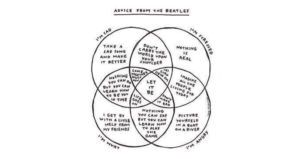LET IT BE – MINDFULNESS
 14 Dec, 2018
14 Dec, 2018
As we are all working through our “To Do” lists for the month of December, we can start to feel tension in the air. Here are a few things you can practice at home or at your desk to keep you grounded and help clear your mind throughout this extremely busy month.
From the famous book “Five Minutes in the Morning”. A Focus Journal Set aside a few minutes spare time for you. Don’t check your phone or laptop. Take three deep breaths instead, as you do, start to concentrate on nothing but the feel of the air as it comes into your body. Feel how it leaves your body with each breath. Feel the sensation in your nostrils, shoulders and rib cage and repeat. We like to breathe in for 3 seconds, hold it for 4 seconds and then breathe out for 5 seconds.
Studies show if your exhale time is longer than your inhale time, it dampens the sympathetic nervous system and activates your parasympathetic nervous system. This means you can reduce acute stress by yourself from this very simple method of box breathing. (reference below)
From another fantastic book “The 4 Pillar Plan” Dr Rangan Chatterjee
Every night before you go to bed, try to write a list of everything that has gone well for you that day. From there, right three things you are grateful for. Dr Chatterjee quotes that studies were carried out by US Psychologist Martin Seligman. People who made this regular practice, will be less depressed and happier within. A US study by Chad Burton had people writing about a positive experience for 20 minutes over three days. Research found participants enjoyed enhanced mood, less illness and made less visits to their doctor. Another research from University of Manchester found that people who had greater feelings of gratitude not only slept better but also had more energy and increased focus.
Listening to music
Research has shown that listening to music can reduce anxiety, blood pressure and pain as well as improve sleep quality, mood, mental alertness and memory. Why not put some headphones on, close your eyes and be fully focused on listening to calming music.
Jigsaws
Sitting down with a large jigsaw can be quite calming. It allows you to focus on completing the picture and helps your brain switch off. Anyone else with me on this one?
Wind of Change are keen to hear how you switch off that busy brain. Let’s share ideas.
References Used
Werntz, D.A., Bickford, R.G. and Shannahoff-Khalsa, D., 1987. Selective hemispheric stimulation by unilateral forced nostril breathing. Hum Neurobiol, 6(3), pp.165-71.

How Healthy are You?
Get a picture of your current health status and habits by taking our short Health and Wellbeing Check!